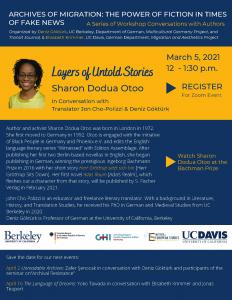In spring 2021, Professors Deniz Göktürk and Elisabeth Krimmer (University of California, Davis) launched a series of real-time video conversations with contemporary writers entitled “Archives of Migration: The Power of Fiction in Times of Fake News.” This ongoing series engages writers who bring diverse perspectives to questions of societal polarization and the power of poetic imagination. The conversations present opportunities to discuss contemporary literature in translation – in correspondence with visual arts and politics. Several conversations have engaged with conceptualizations of archives as sites of creative discovery.
The series was inaugurated with funding from the German Consulate in San Francisco, and we are very grateful to the consulate for their continued support. The organizers would also like to thank our cosponsors, the German Historical Institute Pacific Regional Office and the Institute for European Studies at UC Berkeley, for their steady support of this venture, especially Heike Friedman and Ray Savord who have been managing publicity and hosting the video events, as well as our home departments of German at UC Davis and UC Berkeley, and the Goethe-Institute in San Francisco.
In the inaugural round of conversations, three writers based in Berlin, Germany – Sharon Dodua Otoo, Zafer Şenocak, and Yoko Tawada – presented their recent works. In fall 2021, the series continued to feature multilingual writers, featuring Ilija Trojanow, Saša Stanišić, and Olga Grjasnowa, adding the Institute of Slavic, East European, and Eurasian Studies (ISEEES) as a sponsor. In spring 2022, the series continued in cooperation with the Goethe Institute San Francisco with Fatma Aydemir, Hengameh Yaghoobifarah, Jenny Erpenbeck, and Mithu Sanyal. In fall 2022, we featured Deniz Utlu and the graphic novelist Barbara Yelin.
Video recordings of past events are available for viewing below. See below also for announcements of upcoming conversations.
Spring 2024
Moshtari Hilal | Ugliness as Political Construct
Moshtari Hilal is a visual artist, writer and curator based in Hamburg and Berlin. Hilal studied Islamic Studies and Political Science with a focus on Gender and Decolonial Theory in Hamburg, Berlin and London. She is co-founder of the collective AVAH (Afghan Visual Arts and History) and the research project CCC (Curating Through Conflict with Care) as part of ngbk in Berlin. Together with political geographer Sinthujan Varatharajah, Hilal published September 2022 at Wirklichkeit Books the conversation book “English in Berlin – Exclusions in a Cosmopolitan Society”. Varatharajah and Hilal were awarded the supporting price for critique by the Lessing Academy Wolfenbüttel for their joint work. Hilal is also one of four Villa Serpentara 2023 fellows awarded by the Young Academy of Arts in Berlin and hosted by the Villa Massimo in Rome. Hilal’s essayistic debut “Hässlichkeit” (Ugliness) was published by Hanser in September 2023 and was awarded the Hamburg Literature Prize 2023 for non-fiction. The English translation, Ugliness, will be published by New Vessel Press on February 11, 2025, translated by Elisabeth Lauffer.
With a particular interest in analog drawing and collage, Moshtari Hilal considers her overarching practice to be interdisciplinary and process-oriented. While her work begins with the personal and subjective as a resource and starting point, the process includes research, collaborative and collective practice, and the critical engagement and curatorial mediation with the public. Hilal describes her artistic practice as reconciling with shame and negated beauty, and seeks to understand and critique power and colonial continuities in visual culture. Her practice is informed by (self-)portraits and informal family archives, which she employs in eclectic ways in her search for a visual language. Her work deals with recurring motifs, such as the prominent nose, black hair, the figure of the mother and unreliable childhood memories. Thus, the artist works with the drawn line as a means and symbol of a figurative vocabulary that refers to the black-haired body, as well as visual noise and low resolution, as a method to access precarious material.
If you require an accommodation for effective communication (ASL interpreting/CART captioning, alternative media formats, etc.) or information about campus mobility access features in order to fully participate in this event, please contact Ray Savord at rsavord@berkeley.edu or (510) 642-4555 with as much advance notice as possible and at least 7-10 days before the event.
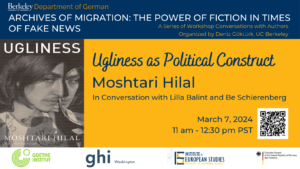
===============================================================================
Fall 2023
Fluid Dreamscapes: Lin Hierse in Conversation with Elizabeth Sun and Deniz Göktürk
Lin Hierse holds an M.A. in Asian Studies and Urban Geography from the Humboldt University of Berlin. She currently works as a journalist and author in Germany, and has been an editor at die tageszeitung (taz) since 2019, where she wrote the column poetical correctness from 2020 to 2023. Her first novel, Wovon wir träumen [What we dream about], was published by Piper in 2022. In elegant and moving narration, the auto-fictional novel offers glimpses and sound bites from the protagonist’s life in Shanghai and Berlin, weaving in fragments from her mother and grandmother’s lives during China’s Cultural Revolution in the 1960s. Transitions between places in this far-flung family story follow the logic of dreams. Hierse has emerged as a unique voice in the growing body of Asian German literature, echoing the beautiful lyricism and coming-of-age reckonings of Ocean Vuong and Jenny Zhang. Most recently, Hierse published the short story “KTV Girl” in the anthology Das Wetter Buch für Text und Musik [The weather book for text & music] (2023, Kiepenheuer & Witsch).
Elizabeth Sun is a PhD student in the Department of German at UC Berkeley. She holds degrees in Comparative Literature and Transcultural Studies from Columbia University and Ruprecht-Karls Universität Heidelberg. Elizabeth is currently a managing editor of TRANSIT: A Journal of Travel, Migration, and Multiculturalism in the German-speaking World, and is a translator of contemporary German language literature.
Deniz Göktürk is Professor of German at the University of California, Berkeley
The discussion will be conducted in English with readings in German.
This event will begin exactly at noon, not ten past.
Ray Savord, rsavord@berkeley.edu, 5106424555
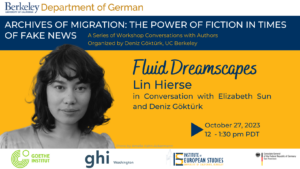
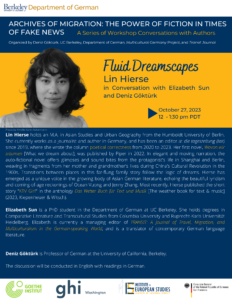
Spring 2023
History in the Making: Tanja Maljartschuk in conversation with Patricia Anne Simpson and Anne Dwyer
Panel Discussion | April 14 | 12-1:30 p.m. | Zoom
Tanja Maljartschuk, Author
Institute of European Studies, Department of German, German Historical Institute Washington | Pacific Office Berkeley, UC Davis Department of German, German Consulate General San Francisco, Goethe-Institut San Francisco
Tanja Maljartschuk is a Ukrainian-born author who writes in both Ukrainian and, more recently, German. She studied philology at Vasyl Stefanyk Precarpathian National University and worked as a journalist in Kiev before emigrating to Vienna in 2011. She published her first novel, A Biography of a Chance Miracle, in 2013. In 2016 she was awarded the BBC Ukrainian’s Book of the Year Award for Oblivion. This novel, which appeared in German as Blauwal der Erinnerung (2019, The Blue Whale of Memories), was also awarded the Usedomer Literaturpreis in 2022. In 2018, she received the Ingeborg-Bachmann Prize for her story “Frösche im Meer.” Her most recent publication is a collection of essays entitled Gleich geht die Geschichte weiter, wir atmen nur aus, written between 2014 and 2022.
Patricia Anne Simpson is professor of German at the University of Nebraska-Lincoln. She is the author of 4 monographs including Reimagining the European Family: Cultures of Immigration and Cultures of Violence in the New German Street. Among her 11 co-edited volumes is Digital Media Strategies of the Far Right in Europe and the United States. The co-authored monograph, Screening Solidarity: Neoliberalism and Transnational Cinemas, is forthcoming.
Anne Dwyer is Senior Associate Dean of the College and Associate Professor of German and Russian at Pomona College. Her research interests include representations of the multiethnic Romanov and Habsburg empires and the history of critical theory. She is the author of The Silly Parade and Other Topsy-Turvy Poems: Russian Folk Nursery Rhymes, Tongue Twisters, and Lullabies.
This event will be conducted entirely in German.
If you require an accommodation for effective communication (ASL interpreting/CART captioning, alternative media formats, etc.) or information about campus mobility access features in order to fully participate in this event, please contact Ray Savord at rsavord@berkeley.edu or (510) 642-4555 with as much advance notice as possible and at least 7-10 days before the event.
Ray Savord, rsavord@berkeley.edu, 510-642-4555
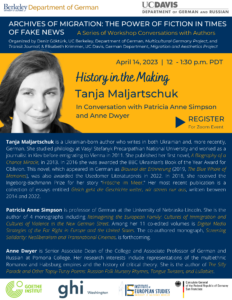
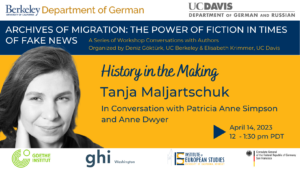
Framing Heimat in Translation: Peyman Azhari in Conversation with Kristin Dickinson
Panel Discussion | March 3 | 12-1:30 p.m. | Zoom
Peyman Azhari, Visual Artist and Photojournalist
Kristin Dickinson, Associate Professor of German Studies, University of Michigan
Institute of European Studies, Department of German, German Historical Institute Washington | Pacific Office Berkeley
Peyman Azhari is an Iranian-German visual artist specializing in photojournalism. While often place-based, his work explores questions of home and belonging in the aftermath of migration, revealing the interlaced nature of the local and transnational. His book length projects include Heimat 132 (2015)—which offers a glimpse into the radical diversity of northern Dortmund through both photographs and interviews—and 1440 Minutes New York City (2011). With a specialization in reportage photography, Azhari’s additional projects have focused on everyday people in transit on the NYC subway (“We Are Not Heroes”); documented a day and night in the small Polish city of Łowicz; and offered a glimpse into the company culture of Dortmund’s Autohaus Rüschkamp, which employs refugees from numerous countries in all five of its branches (“Mobile Heimat”). He has also photographed numerous musicians in performance, including Billie Eilish, Grace Jones, and Gorillaz.
Kristin Dickinson is Associate Professor of German Studies at the University of Michigan. Her research and teaching focus on questions of migration, translation, multilingualism, and cross-cultural contact. Her book Disorientations: German-Turkish Cultural Contact in Translation (1811-1946) appeared in 2021 with Penn State University Press. In 2021-22, she organized the exhibit “Visualizing Translation: Homeland and Heimat in Detroit and Dortmund,” which brought images from Azhari’s Heimat 132 together with Theon Delgado, Sr.’s photographs from the Latinx neighborhood of Southwest Detroit. Forging new connections between Detroit and the Rhine-Ruhr Region, this exhibit explored the resonances of <I>Heimat beyond the linguistic borders of German, while also taking up the power of photographs to capture multilingual communities in action.
In this conversation, Dickinson and Peyman will take up questions of translation from multiple angles. Starting with a series of portraits and interviews in the second half of Heimat 132, they will consider multilingual residents’ attempts to translate Heimat both out of and back into German, thus encouraging us to approach this term relationally rather than as inherently German. Moving on to a series of streetscapes, we will ask: Might photographs engender a similar form of translation capable of forging collaborative modes of belonging? What role does the viewer play vis-à-vis this process? And what new meanings does a collection like Heimat 132 accrue through its travels to the United States?
If you require an accommodation for effective communication (ASL interpreting/CART captioning, alternative media formats, etc.) or information about campus mobility access features in order to fully participate in this event, please contact Ray Savord at rsavord@berkeley.edu or (510) 642-4555 with as much advance notice as possible and at least 7-10 days in advance of the event.
Ray Savord, rsavord@berkeley.edu, 510-642-4555
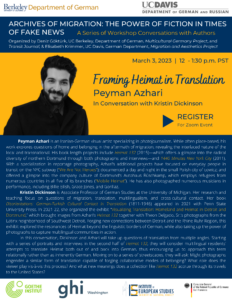
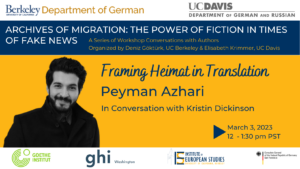
===============================================================================
Fall 2022
December 2, Crossing Borders, Drawing Lives: Barbara Yelin’s Graphic Novel
12:00 – 1:30 pm via Zoom REGISTER HERE
Barbara Yelin in conversation with Brett Sterling and Elisabeth Krimmer

A leading graphic novelist, Barbara Yelin has engaged with German history, in particular the Holocaust, and issues of migration. Born in Munich, she studied illustration at the Hamburg Institute of Applied Sciences and started publishing in France (le visiteur; le retard). Her graphic narrative Gift (2010, with Peer Meter) portrays the story of Gesche Gottfried, a female serial killer in nineteenth-century Bremen. Her graphic narrative Irmina deals with female complicity in the Third Reich. Unsichtbar addresses the travails of Kidane, an Eritrean refugee. Yelin has also drawn comic strips for German newspapers, including the Frankfurter Rundschau and Tagesspiegel, and worked as a reporter illustrator in Cairo, Bali, New Delhi, Tel Aviv, and Pristina. Most recently, she contributed to the anthology But I Live, which is based on interviews with Holocaust survivors. She was awarded the Prix Artémisia, the Bayerischen Kunstförderpreis, the Max-und-Moritz-Preis, and the Ernst-Hoferichter Prize.
Brett E. Sterling is Associate Professor of German in the Department of World Languages, Literatures and Cultures at the University of Arkansas. His research and teaching interests include the intersection of literature and political engagement, diversity and multiculturalism in Germany, the graphic novel and German-language comics, and the works of Austrian exile author Hermann Broch.
October 17, The Language of Archives
12:00 – 1:30 pm via Zoom REGISTER HERE
Deniz Utlu in conversation with Sultan Doughan and Deniz Göktürk
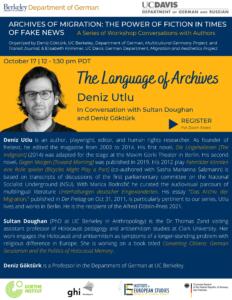 Deniz Utlu is an author, playwright, editor, and human rights researcher. As founder of freitext, he edited the magazine from 2003 to 2014. His first novel, Die Ungehaltenen [The Indignant] (2014) was adapted for the stage at the Maxim Gorki Theater in Berlin. His second novel, Gegen Morgen [Toward Morning] was published in 2019. His 2012 play Fahrräder könnten eine Rolle spielen [Bicycles Might Play a Part] (co-authored with Sasha Marianna Salzmann) is based on transcripts of discussions of the first parliamentary committee on the National Socialist Underground (NSU). With Marica Bodrozic he curated the audiovisual parcours of multilingual literature Unterhaltungen deutscher Eingewanderten. His essay “Das Archiv der Migration,” published in Der Freitag on Oct 31, 2011, is particularly pertinent to our series. Utlu lives and works in Berlin. He is the recipient of the Alfred-Döblin-Preis 2021.
Deniz Utlu is an author, playwright, editor, and human rights researcher. As founder of freitext, he edited the magazine from 2003 to 2014. His first novel, Die Ungehaltenen [The Indignant] (2014) was adapted for the stage at the Maxim Gorki Theater in Berlin. His second novel, Gegen Morgen [Toward Morning] was published in 2019. His 2012 play Fahrräder könnten eine Rolle spielen [Bicycles Might Play a Part] (co-authored with Sasha Marianna Salzmann) is based on transcripts of discussions of the first parliamentary committee on the National Socialist Underground (NSU). With Marica Bodrozic he curated the audiovisual parcours of multilingual literature Unterhaltungen deutscher Eingewanderten. His essay “Das Archiv der Migration,” published in Der Freitag on Oct 31, 2011, is particularly pertinent to our series. Utlu lives and works in Berlin. He is the recipient of the Alfred-Döblin-Preis 2021.
===============================================================================
Spring 2022
April 8, Interrogating Identities
12:00 – 1:30 pm via Zoom REGISTER HERE
Mithu Sanyal in conversation with Priscilla Layne and Elisabeth Krimmer
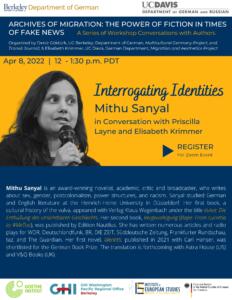 Mithu Sanyal is an award-winning novelist, academic, critic and broadcaster, who writesabout sex, gender, postcolonialism, power structures, and racism. Sanyal studied Germanand English literature at the Heinrich-Heine University in Düsseldorf. Her first book, acultural history of the vulva, appeared with Verlag Klaus Wagenbach under the title Vulva: DieEnthüllung des unsichtbaren Geschlechts. Her second book, Vergewaltigung (Rape: From Lucretiato #MeToo), was published by Edition Nautilus. She has written numerous articles and radioplays for WDR, Deutschlandfunk, BR, DIE ZEIT, Süddeutsche Zeitung, Frankfurter Rundschau,taz, and The Guardian. Her first novel, Identitti, published in 2021 with Carl Hanser, wasshortlisted for the German Book Prize. The translation is forthcoming with Astra House (US)and V&Q Books (UK).
Mithu Sanyal is an award-winning novelist, academic, critic and broadcaster, who writesabout sex, gender, postcolonialism, power structures, and racism. Sanyal studied Germanand English literature at the Heinrich-Heine University in Düsseldorf. Her first book, acultural history of the vulva, appeared with Verlag Klaus Wagenbach under the title Vulva: DieEnthüllung des unsichtbaren Geschlechts. Her second book, Vergewaltigung (Rape: From Lucretiato #MeToo), was published by Edition Nautilus. She has written numerous articles and radioplays for WDR, Deutschlandfunk, BR, DIE ZEIT, Süddeutsche Zeitung, Frankfurter Rundschau,taz, and The Guardian. Her first novel, Identitti, published in 2021 with Carl Hanser, wasshortlisted for the German Book Prize. The translation is forthcoming with Astra House (US)and V&Q Books (UK).
March 18, Blind Spots in Shared Memory
12:00 – 1:30 pm via Zoom RECORDING BELOW
Jenny Erpenbeck in conversation with Lilla Balint and Kurt Beals
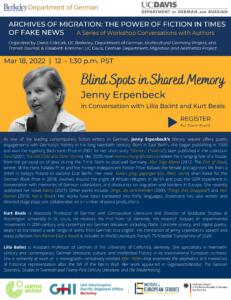 As one of the leading contemporary fiction writers in German, Jenny Erpenbeck’s literary oeuvre offers poetic engagements with Germany’s history in the long twentieth century. Born in East Berlin, she began publishing in 1999 and won the Ingeborg Bachmann Prize in 2001 for her short story “Sibirien,” (“Siberia”), later published in the collection Tand (2001; The Old Child and Other Stories). Her 2008 novel Heimsuchung (Visitation) relates the changing fate of a house, from the persecution of Jews during the Third Reich to post-wall Germany. Aller Tage Abend (2012; The End of Days), winner of the Hans Fallada Prize and the Foreign Independent Fiction Prize, follows the female protagonist’s life from a shtetl in today’s Poland to socialist East Berlin. Her novel Gehen, ging, gegangen (Go, Went, Gone), short-listed for the German Book Prize in 2018, revolves around the plight of African refugees in Berlin and puts the GDR experience in conversation with memories of German colonialism, and discourses on migration and borders in Europe. She recently published her novel Kairos (2021). Other works include: Dinge, die verschwinden (2009; ‘Things that Disappear’) and Kein Roman (2018; Not a Novel). Her works have been translated into thirty languages. Erpenbeck has also written and directed stage plays and collaborated on a number of opera productions.
As one of the leading contemporary fiction writers in German, Jenny Erpenbeck’s literary oeuvre offers poetic engagements with Germany’s history in the long twentieth century. Born in East Berlin, she began publishing in 1999 and won the Ingeborg Bachmann Prize in 2001 for her short story “Sibirien,” (“Siberia”), later published in the collection Tand (2001; The Old Child and Other Stories). Her 2008 novel Heimsuchung (Visitation) relates the changing fate of a house, from the persecution of Jews during the Third Reich to post-wall Germany. Aller Tage Abend (2012; The End of Days), winner of the Hans Fallada Prize and the Foreign Independent Fiction Prize, follows the female protagonist’s life from a shtetl in today’s Poland to socialist East Berlin. Her novel Gehen, ging, gegangen (Go, Went, Gone), short-listed for the German Book Prize in 2018, revolves around the plight of African refugees in Berlin and puts the GDR experience in conversation with memories of German colonialism, and discourses on migration and borders in Europe. She recently published her novel Kairos (2021). Other works include: Dinge, die verschwinden (2009; ‘Things that Disappear’) and Kein Roman (2018; Not a Novel). Her works have been translated into thirty languages. Erpenbeck has also written and directed stage plays and collaborated on a number of opera productions.
January 21, Homeland as Nightmare
12:00 – 1:30 pm RECORDING BELOW
Fatma Aydemir and Hengameh Yaghoobifarah in conversation with Jon Cho-Polizi and Deniz Göktürk
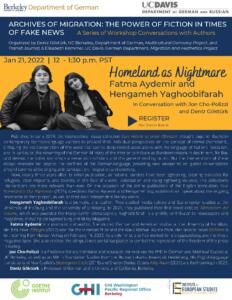 Published in early 2019, the intersectional essay collection Eure Heimat ist unser Albtraum brought together fourteen contemporary German-language authors to present their individual perspectives on the concept of Heimat [homeland]. Critiquing the reappropriation of this word that carries deep-rooted associations with the language of National Socialism, and in particular, the renaming of the German Ministry of the Interior to include as Bundesministerium des Innern, für Bauund Heimat, the collection struck a nerve with scholars and the general reading public. But the interventions of these essays resonate far beyond the confines of the German-language, providing new viewpoints on global conversations around communal belonging and participation, integration and diversity.
Published in early 2019, the intersectional essay collection Eure Heimat ist unser Albtraum brought together fourteen contemporary German-language authors to present their individual perspectives on the concept of Heimat [homeland]. Critiquing the reappropriation of this word that carries deep-rooted associations with the language of National Socialism, and in particular, the renaming of the German Ministry of the Interior to include as Bundesministerium des Innern, für Bauund Heimat, the collection struck a nerve with scholars and the general reading public. But the interventions of these essays resonate far beyond the confines of the German-language, providing new viewpoints on global conversations around communal belonging and participation, integration and diversity.
Now, nearly three years after its initial publication, as national borders have been tightening, creating obstacles for refugees, labor migrants, and tourists, in the face of visceral polarization and rising right wing violence, this collection’s interventions are more relevant than ever. On the occasion of the online publication of the English translation, YourHomeland is Our Nightmare (2021), co-editors Fatma Aydemir and Hengameh Yaghoobifarah will speak about the ongoing resonance of their project, as well as their own independent literary works.
===================================================================================
Fall 2021
October 1 Confluences
12:00 – 1:30 pm RECORDING BELOW
Ilija Trojanow in conversation with Chunjie Zhang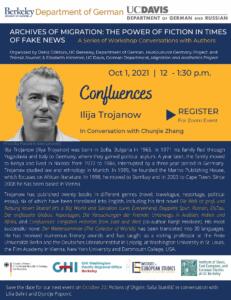
Ilija Trojanow (Iliya Troyanov) was born in Sofia, Bulgaria in 1965. In 1971 his family fled through Yugoslavia and Italy to Germany, where they gained political asylum. A year later, the family moved to Kenya and lived in Nairobi from 1972 to 1984, interrupted by a three-year period in Germany. Trojanow studied law and ethnology in Munich. In 1989, he founded the Marino Publishing House, which focuses on African literature. In 1998, he moved to Bombay and in 2003 to Cape Town. Since 2008 he has been based in Vienna. Trojanow has published twenty books in different genres (novel, travelogue, reportage, political essay), six of which have been translated into English, including his first novel Die Welt ist groß und Rettung lauert überall (It’s A Big World and Salvation Lurks Everywhere), Doppelte Spur: Roman, EisTau, Der entfesselte Globus: Reportagen, Die Versuchungen der Fremde: Unterwegs in Arabien, Indien und Afrika, and Confluences: Forgotten Histories from East and West (co-author Ranjit Hoskote). His most successful novel Der Weltensammler (The Collector of Worlds) has been translated into 30 languages. He has received numerous literary awards and has taught as a visiting professor at the Freie Universität Berlin and the Deutsches Literaturinstitut in Leipzig, at Washington University in St. Louis, the Film Academy in Vienna, New York University and Dartmouth College, USA.
October 22 Fictions of Origins
12:00 – 1:30 pm via Zoom
Saša Stanišić in conversation with Lilla Balint, Djordje Popović, and Damion Searls
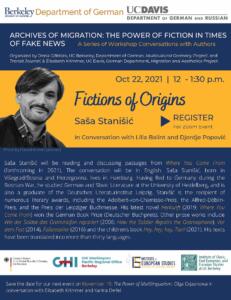 Saša Stanišić will be reading and discussing passages from Where Your Come From (forthcoming in 2021). The conversation will be in English. Saša Stanišić, born in Višegrad/Bosnia and Herzegovina, lives in Hamburg. Fleeing to Germany during the Bosnian War, he studied German and Slavic Literature at the University of Heidelberg, and is also a graduate of the Deutsches Literaturinstitut Leipzig. Stanišić is the recipient of numerous literary awards, including the Adelbert-von-Chamisso-Preis, the Alfred-Döblin-Preis, and the Preis der Leipziger Buchmesse. His latest novel Herkunft (2019; Where You Come From) won the German Book Prize (Deutscher Buchpreis). Other prose works include Wie der Soldat das Grammofon repariert (2006; How the Soldier Repairs the Gramophone), Vor dem Fest (2014), Fallensteller (2016) and the children’s book Hey, hey, hey, Taxi! (2021). His texts have been translated into more than thirty languages.
Saša Stanišić will be reading and discussing passages from Where Your Come From (forthcoming in 2021). The conversation will be in English. Saša Stanišić, born in Višegrad/Bosnia and Herzegovina, lives in Hamburg. Fleeing to Germany during the Bosnian War, he studied German and Slavic Literature at the University of Heidelberg, and is also a graduate of the Deutsches Literaturinstitut Leipzig. Stanišić is the recipient of numerous literary awards, including the Adelbert-von-Chamisso-Preis, the Alfred-Döblin-Preis, and the Preis der Leipziger Buchmesse. His latest novel Herkunft (2019; Where You Come From) won the German Book Prize (Deutscher Buchpreis). Other prose works include Wie der Soldat das Grammofon repariert (2006; How the Soldier Repairs the Gramophone), Vor dem Fest (2014), Fallensteller (2016) and the children’s book Hey, hey, hey, Taxi! (2021). His texts have been translated into more than thirty languages.
November 19 The Power of Multilingualism
12:00 – 1:30 pm via Zoom
Olga Grjasnowa in conversation with Elisabeth Krimmer, Karina Deifel, and Yasemin Yildiz
 Olga Grjasnowa was born in Baku, Azerbaijan and emigrated to Hesse in 1996. Her family was among the 200,000 Russians of Jewish descent who received German citizenship due to the so-called Quota Refugee Act. Grjasnowa studied art history and Slavic Studies at the University of Göttingen and received a degree in Creative Writing from the German Institute for Literature in Leipzig. She has lived in Poland, Russia, Turkey, Israel, and England, where she was a writer in residence at the University of Oxford and the University of Warwick. Grjasnowa is the author of Der Russe ist einer, der Birken liebt (2012; All Russians Love Birch Trees), Die juristische Unschärfe einer Ehe (2014), Gott ist nicht schüchtern (2019; City of Jasmine), Der verlorene Sohn (2020), and Die Macht der Mehrsprachigkeit: Über Herkunft und Vielfalt (2021). She was awarded the Anna Seghers-Preis, Klaus-Michael Kühne Prize, and the Adelbert von Chamisso Prize.
Olga Grjasnowa was born in Baku, Azerbaijan and emigrated to Hesse in 1996. Her family was among the 200,000 Russians of Jewish descent who received German citizenship due to the so-called Quota Refugee Act. Grjasnowa studied art history and Slavic Studies at the University of Göttingen and received a degree in Creative Writing from the German Institute for Literature in Leipzig. She has lived in Poland, Russia, Turkey, Israel, and England, where she was a writer in residence at the University of Oxford and the University of Warwick. Grjasnowa is the author of Der Russe ist einer, der Birken liebt (2012; All Russians Love Birch Trees), Die juristische Unschärfe einer Ehe (2014), Gott ist nicht schüchtern (2019; City of Jasmine), Der verlorene Sohn (2020), and Die Macht der Mehrsprachigkeit: Über Herkunft und Vielfalt (2021). She was awarded the Anna Seghers-Preis, Klaus-Michael Kühne Prize, and the Adelbert von Chamisso Prize.
===================================================================================
Spring 2021
March 5 Layers of Untold Stories
RECORDING BELOW
Sharon Dodua Otoo in conversation with Jon Cho-Polizzi and Deniz Göktürk
Author and activist Sharon Dodua Otoo was born in London in 1972 and moved to Germany in 1992. Otoo is involved with the Initiative of Black People in Germany and Phoenix e.V. and edits the English-language literary series “Witnessed” with Edition Assemblage. After publishing her first two Berlin-based novellas in English, she began publishing in German, winning the prestigious Ingeborg Bachmann Prize in 2016 with her short story Herr Gröttrup setzt sich hin [Herr Gröttrup Sits Down]. Her first novel Adas Raum [Ada’s Realm], which fleshes out a character from that story, was published by S. Fischer Verlag in February 2021.
Just one week after the book launch in Berlin, the event on March 5 was the launch of the book in English language.
Jon Cho-Polizzi is an educator and freelance literary translator. With a background in Literature, History, and Translation Studies, he received his PhD in German and Medieval Studies from UC Berkeley in 2020.
Link to blog posts on the Multicultural Germany Project:
Elizabeth Sun and Ardo Ali: Animating Untold Stories: Sharon Dodua Otoo
Qingyang Zhou: Against Categorization: On Inanimate Objects as Narrators in Sharon Dodua Otoo’s Adas Raum
Apr 2 Unreadable Archives
RECORDING BELOW
 Zafer Şenocak in conversation with Deniz Göktürk, Kristin Dickinson (University of Michigan), and participants of the seminar on “Modern German Literature: Archival Resistance”
Zafer Şenocak in conversation with Deniz Göktürk, Kristin Dickinson (University of Michigan), and participants of the seminar on “Modern German Literature: Archival Resistance”
Zafer Şenocak has been publishing poems and prose in German since 1979. He has held appointments as a writer in residence at various universities in France, Canada, and the United States. His works have been translated into many languages. A selection of his essays was published in English translation by Leslie A. Adelson as Atlas of a Tropical Germany (2000). Fragmentary histories and unreadable archives are recurring themes in his writings. His novel Gefährliche Verwandtschaft (1998) was translated into English by Tom Cheesman as Perilous Kinship (2009). His novel Alman Terbiyesi (2007) was written in Turkish and translated into German by Helga Dağyeli-Bohne as Deutsche Schule (first edition published in 2012; second, revised edition published in 2019). His recent books are In deinen Worten: Mutmaßungen über den Glauben meines Vaters (2016) und Das Fremde, das in jedem wohnt: Wie Unterschiede unsere Gesellschaft zusammenhalten (2018). He also continued to publish volumes of poetry in German and Turkish: Der Gedanke des Freundes (2018) and Kıyı ve Kabuklar (2018). Şenocak is a regular commentator on culture and politics in newspapers such as Die Welt, die tageszeitung, and Der Tagesspiegel. He is currently working on a new novel titled Eurasia.
Kristin Dickinson is Assistant Professor of German Studies at the University of Michigan. Her research and teaching focus on questions of migration, translation, world literature, and multilingualism. Her book Disorientations: German-Turkish Cultural Contact in Translation (1811-1946) is forthcoming in May 2021 with Penn State University Press.
Link to blog posts on the Multicultural Germany Project:
Elizabeth Sun: Imagining the Other Side of Things: Zafer Şenocak and Hidden Archives
Qingyang Zhou: “Ich bin Diskursfeind“: Zafer Şenocak on Unreadable Archives
Apr 16 The Language of Dreams
RECORDING BELOW
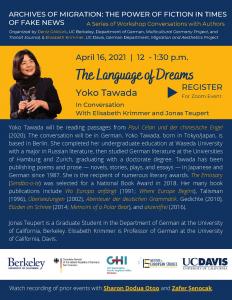 Yoko Tawada in conversation with Elisabeth Krimmer and Jonas Teupert on her novel Paul Celan und der chinesische Engel (2020).
Yoko Tawada in conversation with Elisabeth Krimmer and Jonas Teupert on her novel Paul Celan und der chinesische Engel (2020).
Yoko Tawada, born in Tokyo/Japan, is based in Berlin. She completed her undergraduate education at Waseda University with a major in Russian literature, then studied German literature at the Universities of Hamburg and Zurich, graduating with a doctorate degree. Tawada has been publishing poems and prose—novels, stories, plays, and essays—in Japanese and German since 1987. She is the recipient of numerous literary awards, including the Akutagawa Prize, the Lessing Prize, the Adelbert von Chamisso Prize, the Kleist-Prize, and the Goethe Medal.
The Emissary (Sendbo-o-te) was selected for a National Book Award in 2018. Her many book publications include Wo Europa anfängt (1991; Where Europe Begins), Talisman (1996), Überseezungen (2002), Abenteuer der deutschen Grammatik. Gedichte (2010), Etüden im Schnee (2014; Memoirs of a Polar Bear), and akzentfrei (2016).
Links to blog posts on the Multicultural Germany Project:
Qingyang Zhou and Jezell Lee: Pandemic Palimpsest: Yoko Tawada’s Paul Celan und der chinesische Engel
Elizabeth Sun: Traveling in Pandemic Times: Yoko Tawada and Poetic Border-Crossing

